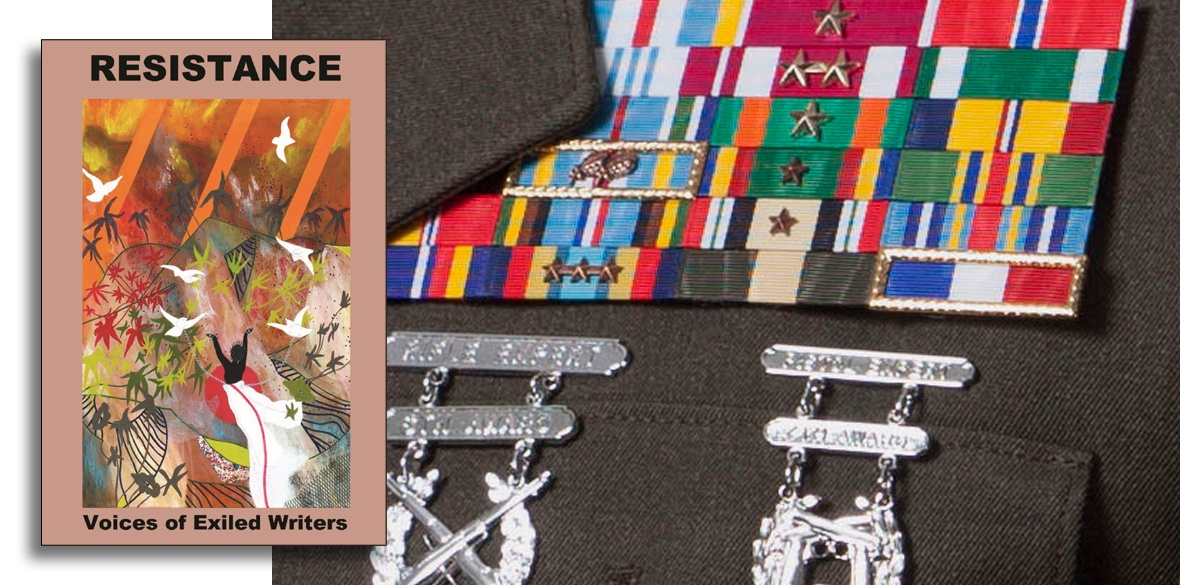This is the last article you can read this month
You can read more article this month
You can read more articles this month
Sorry your limit is up for this month
Reset on:
Please help support the Morning Star by subscribing here
“OUR native soil never allows us to forget,” wrote the Roman poet Ovid when he was in exile by the Black Sea. For Salman Rushdie, exile is “an endless paradox: looking forward by always looking back,” while Palestinian poet Mahmoud Darwish once said that although he had two languages, “I forget which of them I dream in.”
If the 21st century is characterised by exile, emigration and violent displacement, what are the implications for poets who must leave their native languages behind? And what language do they dream in?
Jennifer Langer, the editor of Resistance: Voices of Exiled Writers (Palewell Press, £9.99) brings together in English the voices of 80 writers who have known imprisonment, war, persecution, emigration, refuge and exile in the first two decades of this century.
The book includes several well-known poets such as Ilhan Comak (Turkey), Choman Hardi (Iraq), Yang Lian (China) and the young Afghan poets who perform as The Plaza Girls.
It’s a grim record of some of the appalling events of the last two decades. But it’s also a wonderfully international anthology of poets from all over the world, from the former Yugoslavia, Zimbabwe, Palestine, Kurdistan, Ethiopia, Egypt and Iran to the Western Sahara and Syria.
And there are some fantastic individual poems here, like The Ten-Year-Old Bride (Mehrangiz Rassapour), The Tartan Shirt (Galal El-Behairy), The Year of the Rabbit (Leo Boix), We Want to Live (Amir Darwish), I heard it, but my heart felt it (Simone Yasmin) and Poem for My Country by Afghani Hasan Bamyani:
“Gunfire/What are you doing in my garden?/Get out!/It’s springtime/Flower buds are opening/Nightingales and turtle doves/are singing/They are my beloved/Get out/Get out.”
The book is published to mark the 20th anniversary of Exiled Writers Ink, founded by Langer in order to counter right-wing tabloid narratives about refugees and to promote the work of poets living in exile in Britain.
Also just published are seven beautiful chapbooks by writers who have come through their mentoring and translation project, three of whom are included in the anthology. Each, in its different way, tells a common, shared story of loss and loneliness.
Nicaraguan-born Lester Gomez Medina grew up in Costa Rica and The Riddle of the Cashew is partly about the obliteration of childhood during the US wars in Central America, when “rain reverberated over the houses/like bombs” and bullets bounced on the roof like rain:
“We saw war,/it came to school/wearing green,/boots and caps./It took us by surprise/in the classroom./It stood in front of the desks/and the blackboard./It asked the teacher/for the register,/called out our names...”
Jan-An Saab’s Verses from the Levant also talks about the way that “The war took away the country of birth” while from Cyprus, Hasan Kahya’s The Pale Map talks about the difference between forgiving the past and forgetting it.
From Poland, Agata Palmer’s From the Land of Marmite with Love is good on the alienation of the immigrant: “No matter how integrated you seem/moments will ambush you, when it feels like/looking through glass/people can see in,/but inner shadows will keep you captive/with sticky layers of separateness.”
Syrian-born Nadia Menzalji’s Traces and Blossoms describes a longing for something she knows is supposed to be called happiness: “I have spent my life waiting for it/at arrival, it emptied its bowels on me/it seems happiness never recognised me/it thought that I am a tree/it seems I did not recognise it/I thought it was a dog!”
The Planet of the Immortals by the Iranian writer Mehrangiz Rassapour is a ruthlessly bleak account of life on our stupid planet: “Hollow medals of heroism/Fame without ownership/Fetid mornings of whorehouses/Ridiculous faces of religion... Faithful torturers/Shredded protests/Mouldy jobs/Shining historical defeats/Unfinished chattering/Travelogues of internet tourists/Screeching of ideological mobiles/Squawking of postmodern poets... famine, bullet, vulture... and blood.’
But the strongest of these chapbooks is Suhrab Sirat’s The Eighth Crossing, which follows the epic journey of a group of Afghan refugees as they make their slow, painful and dangerous way across Europe:
“In the daytime,/the coastlines of Izmir/are a peaceful bed for those/who tan their bodies/and swap smiles with the water... On the rocky beaches of Lesbos,/sea-sickened passengers,/fearful of return,/are knife-stabbing an inflatable boat...”









